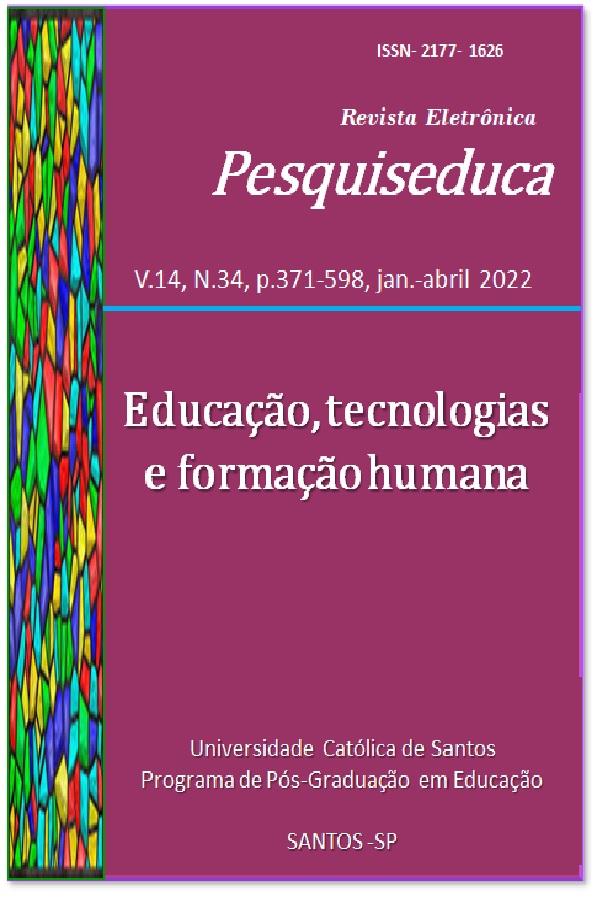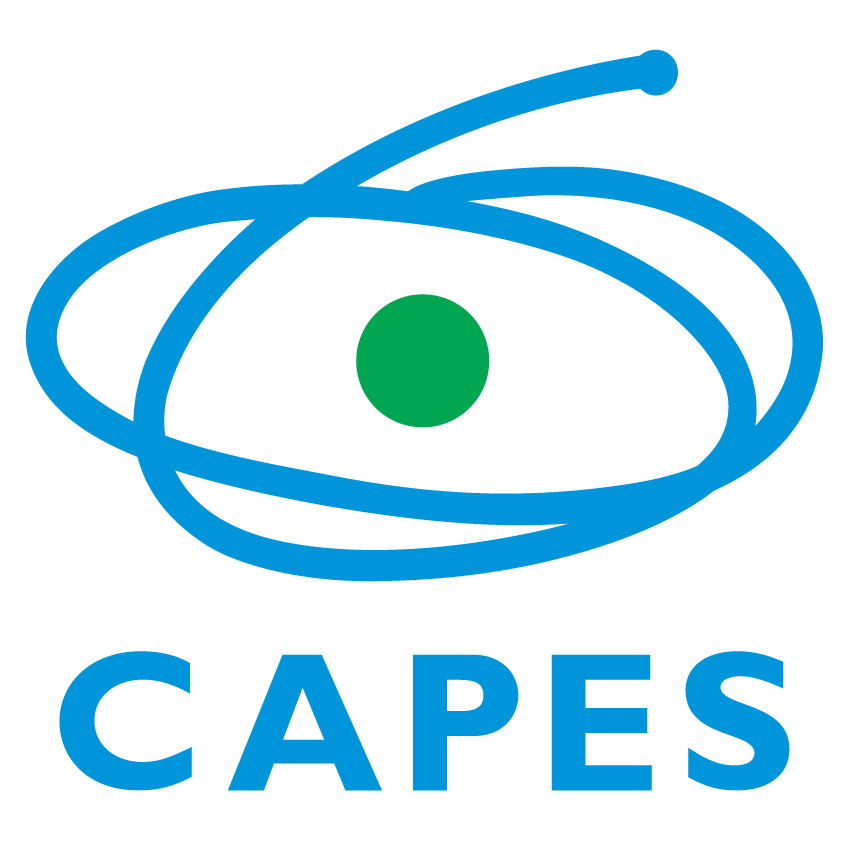Los Componentes del Aprendizaje Autorregulado y los Logros Académicos en Cursos en Línea
DOI:
https://doi.org/10.58422/repesq.2022.e1153Palavras-chave:
Cursos online, Aprendizagem autorregulada, Educação online, Cursos en línea. Aprendizaje autorregulado. Educación en líneaResumo
En este trabajo se presentan los resultados de un estudio cuyo objetivo fue determinar qué componentes del Aprendizaje autorregulado están asociados con los Logros académicos de los estudiantes de cursos en línea del Centro Universitario del Sur de la Universidad de Guadalajara en México. El enfoque fue cuantitativo con un diseño trasversal. La muestra fue representativa con el 95 % de nivel de confianza y el 5 % de error, la integraron 306 estudiantes de licenciatura que tomaban al menos un curso en línea. Se aplicó un cuestionario compuesto por 70 ítems que tuvo una Alfa de Cronbach de .90. Para el análisis de los datos se utilizó la estadística descriptiva, las correlaciones y la regresión ordinal. Los principales resultados muestran que existe una asociación entre los Logros académicos con los componentes motivacionales: Valor de la tarea, Autoeficacia para el aprendizaje y la Ansiedad en cursos en Línea, así como con el componente conductual: Regulación del esfuerzo.
Referências
AREA, M. & ADELL, J. (2009). eLearning: Enseñar y aprender en espacios virtuales. En De Pablos, J. (Coord). Tecnología Educativa. La formación del profesorado en la era de internet. Málaga: Ediciones Aljibe, 2009.
BANARD-BRAK, L., LAN, W. y PATON, V. O. Profiles in Self-Regulated Learning in the Online Learning Environment. International Review of Research in Open and Distance Learning, v.11, n.1, p. 61-80, 2010.
BEAUDOIN, M., KURTZ, G., JUNG. I., SUZUKI, K. y GRABOWSKI, B. L. Online Learner Competencies. Knowledge, Skills, and Attitudes for Successful Learning in Online and Blended Settings. USA: Information Age Publishing, 2013.
BORGES, F. El estudiante de entornos virtuales. Una primera aproximación. Digithum, n.9, p. 1-8, 2007.
BROADBENT, J. y POON, W. L. Self-regulated learning strategies & academic achievement in online higher education learning environments: A systematic review. The internet and Higher Education, v.27, p. 1-13, 2015. DOI: 10.1016/j.iheduc.2015.04.007
CEA D’ANCONA, M. A. Análisis Multivariable. Teoría y Práctica en la Investigación Social. España:Editorial.Síntesis,2004.Disponible en: http://www.cusur.udg.mx/es/sites/default/files/adjuntos/d_589_2014_evas.pdf
CENTRO UNIVERSITARIO DEL SUR. Manual para el uso y manejo de los ambientes virtuales de aprendizaje del Centro Universitario del Sur, 2014. Acceso en 10 feb. 2019.
CENTRO UNIVERSITARIO DEL SUR (2018). Numeralia CUSur. Información e Indicadores Básicos, 2018. Acceso 10 feb. 2019. Disponible en: http://www.cusur.udg.mx/es/sites/default/files/adjuntos/septiembre_2018.pdf
CHO, M. & HERON, M. L. Self-regulated learning: the role of motivation, emotion, and use of learning strategies in students’ learning experiences in a self-paced online mathematics course. Distance Education, v.36, n.1, p. 80-99, 2015. DOI: 10.1080/01587919.2015.1019963
CHO, M. & SHEN, D. Self-regulation in online learning. Distance Education, v.34, n.3, p. 290-301, 2013. DOI: 10.1080/01587919.2013.835770.
DARREN, G. y MALLERY, P. IBM SPSS Statistics 23 Step by Step: A Simple Guide and Reference. New York: Routledge, 2016.
HARRELL, L. A Learner Centered Approach to Online Education. USA: Information Age Publishing, 2013.
KHAN, B. Introduction to E-learning. En Bradul H. Khan y Mohamed Ally (Eds.). International Hadbook of E-learning. USA: Routledge, 2015.
KHAN, B. Introduction. En Bradul H. Khan (Eds.). Revolutionizing Modern Education through Meaningful E-Learning Implementation. USA:IGI Global, 2016. DOI: 10.4018/978-1-5225-0466-5
LAMAS, H.A. Sobre el rendimiento escolar. Propósitos y Representaciones, v.3, n.1, p.313-350, 2015. DOI: 10.20511/pyr2015.v3n1.74
LIM, L. y YEO, K. The relationship between motivational constructs and self-regulated learning: A review of literature. International Journal of Evaluation and Research in Education, v.10, n.1, p. 330-335, 2021.DOI: 10.11591/ijere.v10i1.21006
LIAW, HUANG y CHEN, 2007 Surveying instructor and learner attitudes toward e-learning. Computers & Education, v.49, n.4, p.1066-1088, 2007. DOI: 10.1016/j.compedu.2006.01.001
LÓPEZ, H. (1998). La metodología de la encuesta. En J. Galindo (Coord.). Técnicas de Investigación en Sociedad, cultura y comunicación. México: Pearson, 1998.
NAVARRO, E., VERBEL, A., ROBLES, D. y HURTADO, K. Regresión Logística Ordinal Aplicada a la Identificación de Factores de Riesgo para Cáncer de Cuello Uterino. Ingeniare, v.9, n.17, p. 87-105, 2014.
PANADERO, E. A Review of Self-regulated Learning: Six Models and FourDirections for Research. Frontiers in Psychology, v.8, p. 1-28, 2017. DOI: 10.3389/fpsyg.2017.00422
PAECHTER, M., MAIER, B. y MACHER, D. Students’ expectations of, and experiences in e-learning: Their relation to learning achievements and course satisfaction. Computer & Education v.54, n.1 p. 222-229, 2010. DOI: 10.1016/j.compedu.2009.08.00
PEÑALOSA, E. Estrategias docentes con tecnologías: Guía práctica. México: Pearson educación, 2013.
PINTRICH, P., SMITH, D., GARCÍA, T. y MCKEACHIE, W.(1991). A Manual for the Use of the Motivated Strategies for Leaning Questionnaire (MSLQ), 1991. Acceso en: 16 de junio de 2018. Disponible en la base de datos de ERIC: https://eric.ed.gov/?id=ED338122
PINTRICH, P., SMITH, D, GARCÍA, T. & MCKEACHIE, W. Reliability and Predictive Validity of the Motivated Strategies for Learning Questionnaire (MSLQ). Educational and Psychological Measurement, v.53, n.3, p.801-813, 1993.
PINTRICH, P. (2000). The Role of Goal Orientation in Self-Regulated Learning. En Zeidner, Moshe, Pintrich, Paul R., Boekaerts, Monique (Eds.). Handbook of Self-Regulation. USA: Elsevier Academy Press, 2000.
POWELL, A. El futuro del aprendizaje: tendencias en la educación K-12 mixta y en línea en los Estados Unidos. Revista Mexicana de Bachillerato a Distancia, v.7, n.13, p. 8-23, 2015.
PUZZIFERRO, M. Online Technologies Self-Efficacy and Self-Regulation Learning as Predictors of Final Grade and Satisfaction in College-Level Online Courses. American Journal of Distance Education, v.22, n.2, p.72-89, 2008. DOI: 10.1080/08923640802039024
SANCHO, T. y BORGES, F. (2011). El aprendizaje en un entorno virtual y su protagonista el estudiante virtual. En Gros, B. (Ed.). Evolución y retos de la educación virtual. Construyendo el e-learning del siglo XXI. España: Editorial UOC, 2011.
SEP. Número de Folio 0001100063918, Ciudad de México, México: Secretaria de Educación Pública, 13 de marzo de 2018. Asunto: Matrícula activa de estudiantes de bachillerato, licenciatura y técnico Superior
SCHUNK, D. Teorías del Aprendizaje. Una perspectiva educativa. México: Pearson, 2012.
SUÁREZ, J. M. y FERNÁNDEZ A. P. El aprendizaje autorregulado: variables estratégicas, motivacionales, evaluación e intervención. España: Universidad Nacional a Distancia, 2016.
UNIVERSIDAD DE GUADALAJARA. Numeralia Institucional, 2018. Acceso en: 15 de ene. 2021. Disponible en: de http://www.udgvrtual.udg.mx/sites/default/files/informe_interactivo_suv-2015.pdf
UNIVERSIDAD NACIONAL AUTONOMA DE MÉXICO (UNAM). Agenda Estadística, 2017. Acceso en: 15 de ene. 2021. Disponible en: https://www.planeacion.unam.mx/Agenda/2017/disco/#
VALENZUELA-ZAMBRANO, B., Y PÉREZ-VILLALOBOS, M. V. Aprendizaje autorregulado a través de la plataforma virtual Moodle. Educación y Educadores, v.16, n.1, p. 66-79, 2013.
VINUESA, P. Correlación: teoría y práctica, 2016. Acceso en: 6 de jun. 2020. Disponible en: https://www.ccg.unam.mx/~vinuesa/R4biosciences/docs/Tema8_correlacion.html
VERDÚN, N. (2016). Educación virtual y sus configuraciones emergentes: Notas acerca del e-learning, b-learning y m-learning. En Casillas & Ramírez (Eds). Háblame de TIC: Educación virtual y recursos educativos.
WANG, C., SHANNON, D. y ROSS, M. Students’ characteristics, self-regulated learning, technology self-efficacy, and course outcomes in online learning. Distance Education, v.34, n.3, p. 302-323, 2013. DOI: 10.1080/01587919.2013.835779
WEINSTEN, C. E., ACEE, T. W. y JUNG, J. Self-regulation and Learning strategies. New directions for teaching and learning, v.2011, n.126, p.45-53, 2011. doi: 10.1002/tl.443
WHITE, M. C. y DIBENEDETTO, M. K. Self-Regulation and the Common Core: Application to ELA Standards. USA: Taylor and Francis, 2015.
ZIMMERMAN, B. Self-Regulated Learning and Academic Achievement: Theoretical Perspectives. Schunk, D. H. & Zimmerman, J. B. (Eds.). Theories of Self-Regulated Learning and Academic Achievement: An Overview and Analysis. USA: Lawrence Erlbaum Associates, 2001.
ZIMMERMAN, B. (2002). Becoming a Self-Regulated Learner: An Overview. Theory into Practice, v.41, n.2, p. 64-70, 2002. DOI: 10.1207/s15430421tip4102_2
ZIMMERMAN, B. Investigating Self-Regulation and Motivation: Historical Background, Methodological Developments, and Future Prospects. American Educational Research Journal, v.45, n.1, p. 166 –183, 2008. DOI: 0.3102/0002831207312909.
Downloads
Publicado
Como Citar
Edição
Seção
Licença

Este trabalho está licenciado sob uma licença Creative Commons Attribution 4.0 International License.
Revista Eletrônica Pesquiseduca, Revista do Programa de Pós-Graduação em Educação - Universidade Católica de Santos (ISSN: 2177-1626) é detentora dos direitos autorais de todos os artigos publicados por ela. A reprodução total dos textos em outras publicações, ou para qualquer outro fim, por quaisquer meios, requer autorização por escrito do editor. Reproduções parciais de artigos (resumo, abstract, mais de 500 palavras de texto, tabelas, figuras e outras ilustrações) deverão ter permissão por escrito do editor e dos autores.










